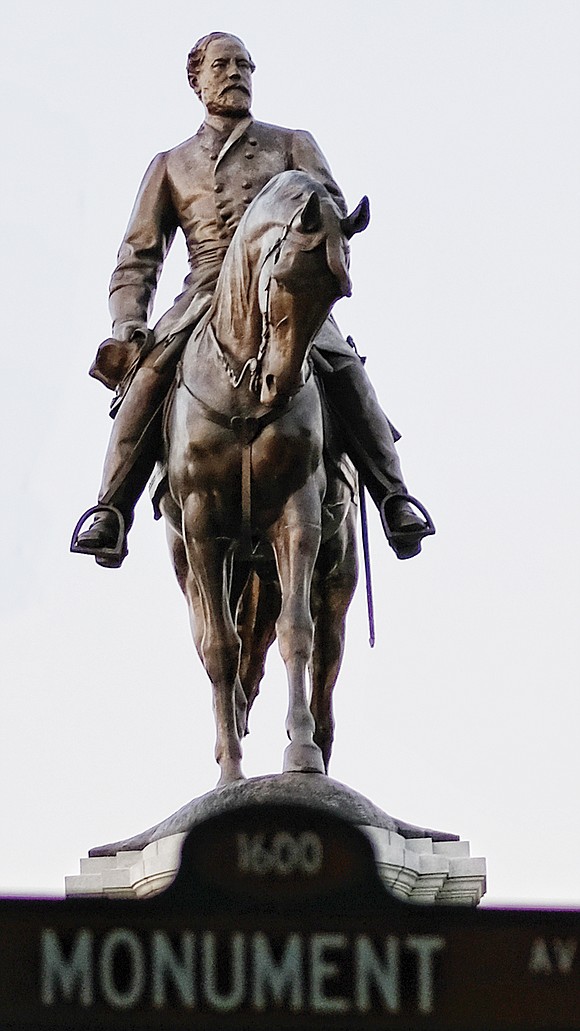Stay or go?
The Virginia Supreme Court will hear arguments next Tuesday on whether Gov. Ralp S. Northam has the authority to remove the Monument Avenue statue of Confederate Gen. Robert E. Lee
Jeremy M. Lazarus | 6/3/2021, 6 p.m.
The fate of the giant statue of slavery-defending Confederate Gen. Robert E. Lee that has loomed over Monument Avenue for more than 130 years now rests with the seven justices of the Virginia Supreme Court.
The court has scheduled arguments for next Tuesday, June 8, on lawsuits questioning the authority of the state to remove the symbol of white supremacy from property owned by the state. The cases involve two sets of litigants seeking to block Gov. Ralph S. Northam from getting rid of the monument.
The plaintiffs challenging the governor already have lost in Richmond Circuit Court.
However, until the hearing is held, the state’s highest court has refused to dissolve an injunction imposed by the lower court barring Gov. Northam from removing the Lee statue.
In 1889, the General Assembly authorized the governor to accept ownership of the land and the statue on behalf of the state; the statue was installed in 1890 at Allen and Monument avenues.
The justices, who agreed during the winter to take up the cases involving the statue’s future, apparently held off oral arguments to avoid having an impact on the Democratic primary which also culminates Tuesday.
The governor’s attorney, Attorney General Mark R. Herring, is running for re-election against a tough challenger, Delegate Jay Jones of Norfolk. Both have favored the removal of Confederate statues.
The legal fights over the Lee statue have been ongoing since Gov. Northam announced last June plans to take down the Lee statue. He made the announcement amid daily demonstrations in Richmond spawned by the death of George Floyd at the hands of Minneapolis Police. Demonstrators were advocating for racial justice and protesting police brutality and decades of oppression of Black people and other minorities. The upheaval also led to City Hall’s removal of city-owned Confederate statues along Monument Avenue and in other parts of Richmond. City officials now are seeking authority to remove the pedestals of those statues that were long part of city, state and federal historic districts.
One lawsuit, which was quickly thrown out in Richmond Circuit Court, involves claims that the Lee statue was given to the state on a promise that it would forever be cared for and protected.
That suit was brought by William C. Gregory, the purported heir of the property owners who gave to the state the Monument Avenue land upon which the statue stands. The Richmond court found Mr. Gregory had no legal right to sue, but the high court still took up his appeal.
The other suit was brought by five property owners who claimed that the gift to the state came with a deed restriction that ensured the statue would always be there. Only three of those property owners, Janet Hetzel, George Hostetler and Morgan Massey, are still on the appeal.
In October, Richmond Circuit Judge W. Reilly Marchant rejected their claims that the deed restriction was still enforceable.
He cited as “the most significant evidence” the General Assembly’s passage of a budget that included language repealing the 1889 resolution accepting the Lee statue. The approved language also directs the governor to proceed with removal and provides funding to cover the cost. Judge Marchant said that was proof that the “current public policy ... is to remove the Lee Monument.”
Even the plaintiffs agree their claims largely would fail if the state Supreme Court upholds that legislative action, wrote Virginia Solicitor General Toby J. Heytens in urging their claims to be thrown out.
Mr. Heytens is the member of Mr. Herring’s staff who handles such appeals.
Mr. Heytens stated, “The governor has determined that a Commonwealth-owned statue should be relocated from one area of Commonwealth ownership and control to another. The General Assembly has agreed. That should be the end of the matter.
“In contrast,” he continued, “the plaintiffs insist that those who held power in Virginia more than 130 years ago made a binding promise that a massive monument to the (Confederate) ‘Lost Cause’ must remain in its current location forever and that any (person) may enforce that promise in perpetuity by way of an injunction.
“Government-owned monuments on government-owned land are core government speech,” he wrote, “and plaintiffs are seeking to use the equitable powers of the courts to force the government of 2021 to continue saying things it no longer wishes to say.”
Mr. Heytens noted that the court has long held that the “legislative powers of the General Assembly are without limits,” which includes the authority to alter or abolish deed restrictions or to remove publicly owned statues, he stated.
Separately, City Hall has cleared its first hurdle for the proposed removal of the pedestals that once held city-owned Confederate statues.
Last week, the internal Commission of Architectural Review, which governs Old and Historic Districts, recommended approval of a city plan to remove four pedestals from Monument Avenue, another from Libbie Hill in the East End and the statue and grave of Confederate Gen. A.P. Hill in North Side.
The commission voted unanimously May 25 to support the proposal with small modifications, after being told the removal would not affect the historic designations of the neighborhoods where the pedestals are located.
The Stoney administration’s plan now goes to the Urban Design Commission. The city Planning Commission, which governs public monuments, also will consider the proposal later this month and send its recommendation to City Council for consideration.







